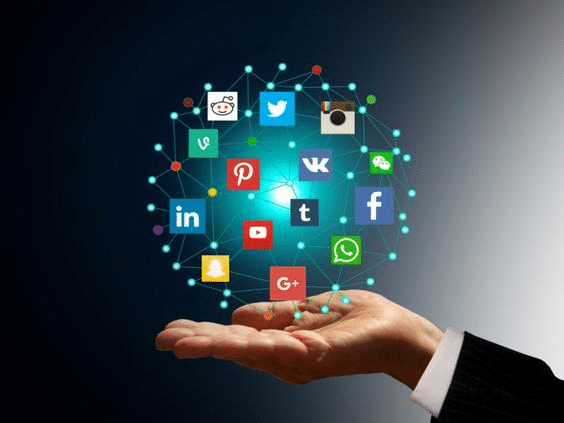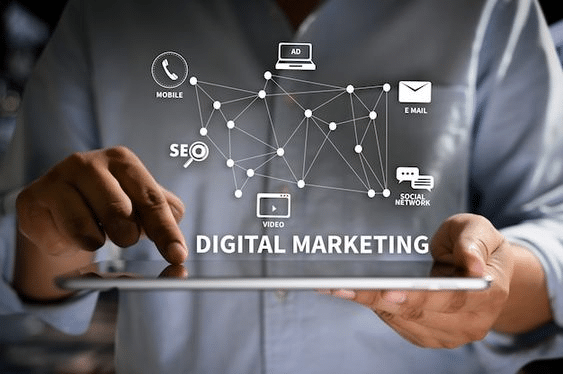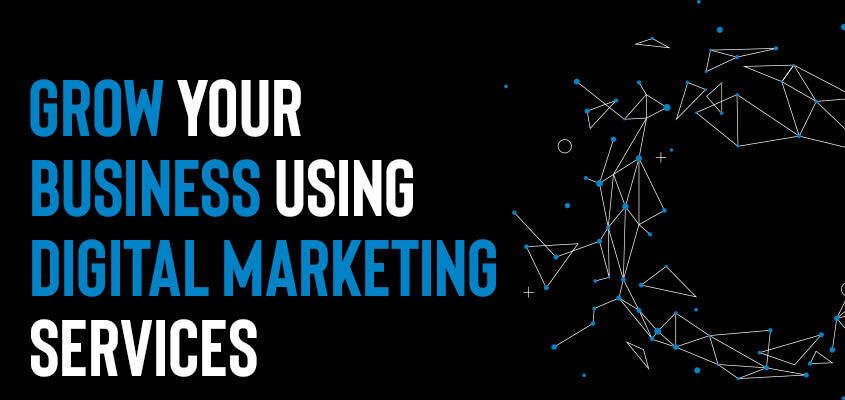You’ve probably heard the buzz about digital marketing, but what is Digital Marketing?

In this article, we’ll dive into the fascinating world of digital marketing, exploring its types, benefits, and why businesses need digital marketing expertise.
Related: Content Monitoring: Successful Strategies for Website and SEO
Digital Marketing: What’s the Buzz About?

In simple terms, digital marketing is the use of various online channels and platforms to promote products or services and connect with potential customers.
It’s like the modern-day magic wand that businesses use to reach their target audience, create brand awareness, and drive sales.
Digital marketing is the use of digital channels to promote or market products and services to consumers and businesses. It includes a wide range of tactics and strategies, such as:
- Search engine optimization (SEO)
- Pay-per-click (PPC) advertising
- Social media marketing
- Content marketing
- Email marketing
- Affiliate marketing
- Influencer marketing
- Display advertising
- Native advertising
- Marketing automation
- Mobile Marketing
Digital marketing allows businesses to reach their target audiences in a more targeted and measurable way than traditional marketing methods. It also provides several advantages, such as:
- Cost-effectiveness: Digital marketing channels can be very cost-effective, especially when compared to traditional advertising methods.
- Measurability: Digital marketing campaigns can be easily tracked and measured, allowing businesses to see what’s working and what’s not.
- Targeting: Digital marketing allows businesses to target their marketing messages to specific audiences based on factors such as demographics, interests, and online behaviour.
- Scalability: Digital marketing campaigns can be easily scaled up or down to meet the needs of businesses of all sizes.
Digital marketing is an essential part of any modern marketing strategy. Businesses that don’t have a digital marketing presence are missing out on a huge opportunity to reach their target audiences and grow their businesses.
Here are some examples of digital marketing in action:
- A business might use SEO to optimize its website so that it ranks higher in search engine results pages (SERPs) for relevant keywords. This will help them get more organic traffic to their website.
- A business might use PPC advertising to create ads that appear at the top of SERPs. This can be a good way to get quick traffic to a website, especially for new businesses.
- A business might use social media marketing to connect with its target audience on platforms like Facebook, Twitter, and Instagram. They can use social media to share content, run contests, and promote their products and services.
- A business might use content marketing to create and distribute valuable, relevant, and consistent content to attract and retain a clearly defined audience and drive profitable customer action.
- A business might use email marketing to send newsletters, promotional offers, and other messages to their subscribers.
Digital marketing is a complex and ever-evolving field, but it is essential for businesses of all sizes. By investing in digital marketing, businesses can reach their target audiences more effectively and efficiently and grow their businesses faster.
Related: Classified Ads: Types, Advantages, and Risks Involved
Types of Digital Marketing

Here are some popular types of digital marketing:
- Search Engine Optimization (SEO): This is all about making your website rank higher on search engine results pages like Google. By optimizing your content and website structure, you can attract organic traffic and increase your online visibility.
- Content Marketing: Content is king in the digital world. Businesses use blogs, articles, videos, and other forms of content to engage their audience, provide valuable information, and establish their expertise.
- Social Media Marketing: It’s all about being where your audience hangs out. Businesses use platforms like Facebook, Instagram, Twitter, and LinkedIn to connect with their customers, run ads, and build a loyal following.
- Email Marketing: Sending targeted emails to potential and existing customers can be a highly effective way to nurture leads, promote products, and maintain customer relationships.
- Pay-Per-Click (PPC) Advertising: This involves running ads on search engines or social media platforms. Businesses pay a fee each time someone clicks on their ad, making it a cost-effective way to reach a specific audience.
- Affiliate Marketing: Partnering with affiliates who promote your products in exchange for a commission is a powerful way to expand your reach.
- Influencer Marketing: Collaborating with influencers who have a significant following can help you gain credibility and trust with your audience.
- Online Public Relations (PR): Managing your online reputation and building a positive image for your brand is crucial. Online PR includes activities like managing reviews, handling crises, and monitoring social media mentions.
Related: Best Hashtags for Small Businesses to Reach their Target Audience on Social Media
Businesses that Need Digital Marketing Expertise

In today’s digital age, almost all businesses can benefit from digital marketing expertise.
Whether you’re a small local bakery, an e-commerce giant, a tech startup, or a healthcare provider, digital marketing can help you thrive.
Here are a few examples of businesses that particularly need digital marketing:
- E-commerce Stores: If you’re selling products online, digital marketing is essential for driving traffic, increasing sales, and standing out in a competitive market.
- Local Businesses: From restaurants to hair salons, local businesses can use digital marketing to attract nearby customers through tools like Google My Business and social media.
- Startups: New businesses can gain a strong online presence quickly with the right digital marketing strategies, helping them compete with established players.
- B2B Companies: Businesses that sell to other businesses can use digital marketing to generate leads, build credibility, and nurture long-term relationships.
- Healthcare Providers: Even in the healthcare industry, digital marketing can help clinics and hospitals reach and educate patients, streamline appointment scheduling, and build trust.
Related: How to Find Your Target Audience (2023)
Benefits of Digital Marketing to Businesses

Digital marketing offers a plethora of benefits to businesses, both large and small:
- Cost-Effective: Compared to traditional advertising methods, digital marketing is often more affordable, allowing businesses to reach a wider audience without breaking the bank.
- Measurable Results: With digital marketing tools, you can track and measure your campaigns’ performance in real-time, enabling you to adjust your strategies for better results.
- Targeted Audience: You can precisely target your ideal customers based on demographics, interests, and behaviour, increasing the chances of converting leads into customers.
- Global Reach: Digital marketing breaks down geographical barriers, enabling businesses to reach a global audience, even with a small budget.
- Improved Customer Engagement: Interactive content, social media engagement, and personalized emails can help you connect with your audience on a deeper level, fostering customer loyalty.
- Competitive Advantage: Businesses that embrace digital marketing gain a competitive edge, as they can adapt quickly to market changes and emerging trends.
Related: What is Influencer Marketing? The Ultimate Guide for 2023
Learning Digital Marketing

There are many ways to learn digital marketing. Here are a few tips:
- Take online courses. There are many high-quality online courses available that can teach you the basics of digital marketing. Some popular platforms include Udemy, Coursera, and LinkedIn Learning.
- Read books and blog posts. There are also many great books and blog posts available on digital marketing. Some popular authors and bloggers include Neil Patel, Seth Godin, and Gary Vaynerchuk.
- Watch videos and webinars. There are also many informative videos and webinars available on digital marketing. You can find these on YouTube, Vimeo, and other video-sharing platforms.
- Attend conferences and workshops. Attending conferences and workshops is a great way to learn from experts and network with other digital marketers.
- Get certified. There are several digital marketing certifications available, such as the Google Ads Certification and the HubSpot Academy Certification. Getting certified can demonstrate your skills to potential employers and clients.
In addition to learning the basics of digital marketing, it is also important to gain practical experience. The best way to do this is to start your digital marketing project or to volunteer to help a friend or family member with their digital marketing.
Here are some specific tips for learning different aspects of digital marketing:
- Search engine optimization (SEO): To learn SEO, you can start by reading the Google Search Engine Optimization Starter Guide. You can also find many helpful SEO resources on the Moz blog and the SEMrush blog.
- Pay-per-click (PPC) advertising: To learn PPC advertising, you can start by reading the Google Ads Help Center. You can also find many helpful PPC resources on the AdWords blog and the Bing Ads blog.
- Social media marketing: To learn social media marketing, you can start by reading the social media marketing guides from Facebook, Twitter, and Instagram. You can also find many helpful social media marketing resources on the Hootsuite blog and the Sprout Social blog.
- Content marketing: To learn content marketing, you can start by reading the content marketing guides from HubSpot and Content Marketing Institute. You can also find many helpful content marketing resources on the Copyblogger blog and the Neil Patel blog.
- Email marketing: To learn email marketing, you can start by reading the email marketing guides from MailChimp and Constant Contact. You can also find many helpful email marketing resources on the Litmus blog and the GetResponse blog.
Learning digital marketing can be a challenge, but it is a rewarding one. By following the tips above, you can learn the skills you need to succeed in the digital marketing field.
Related: How to Build Online Presence for Your Business
Conclusion
Marketing is a dynamic and essential tool for businesses in the digital age.
With its various types and numerous benefits, it’s a versatile way to connect with your audience, drive sales, and stay competitive in the ever-evolving world of online marketing.
So, whether you’re a startup or an established brand, it’s time to harness the power of digital marketing to reach new heights in your business journey.
If there are any questions, post them below.
FAQs About Digital Marketing
Is digital marketing only for big companies?
No, digital marketing is for businesses of all sizes. Small businesses can benefit just as much as large corporations.
Do I need a website to start digital marketing?
While a website is a valuable asset, you can also use social media platforms and other online channels for digital marketing.
Is digital marketing effective for local businesses?
Absolutely! Local businesses can use tools like Google My Business, local SEO, and social media to attract nearby customers. Local businesses need to have a strong digital presence to compete in today’s marketplace.
Here are some of the ways that digital marketing can benefit local businesses:
Increased visibility: Digital marketing can help local businesses to increase their visibility online. This can be done through a variety of tactics, such as SEO, PPC advertising, and social media marketing.
Targeted reach: Digital marketing allows local businesses to target their marketing messages to specific audiences based on factors such as demographics, interests, and online behaviour. This can help them to reach the people who are most likely to be interested in their products and services.
Cost-effectiveness: Digital marketing can be very cost-effective, especially when compared to traditional marketing methods. For example, PPC advertising allows businesses to only pay when someone clicks on their ad.
Measurable results: Digital marketing campaigns can be easily tracked and measured, allowing local businesses to see what’s working and what’s not. This information can then be used to improve future campaigns.
Here are some specific examples of how local businesses can use digital marketing to their advantage:
A local restaurant can use SEO to optimize its website so that it ranks higher in SERPs for relevant keywords, such as “best restaurants in [city]” and “[city] restaurants with outdoor seating.”
A local dentist can use PPC advertising to create ads that appear at the top of SERPs when people search for keywords such as “dentist near me” and “emergency dentist.”
A local clothing store can use social media marketing to connect with its target audience on platforms like Facebook and Instagram. They can use social media to share photos of new products, run contests, and promote their sales.
A local gym can use content marketing to create blog posts and videos about fitness and nutrition. This can help them to attract and retain new customers.
A local salon can use email marketing to send newsletters and promotions to their subscribers.
Overall, digital marketing is a powerful tool that can help local businesses reach their target audiences more effectively and efficiently. By investing in digital marketing, local businesses can grow their businesses and achieve their goal.
How long does it take to see results from digital marketing?
It depends on your strategy, but many businesses start seeing results within a few months. Patience and consistency are key.

